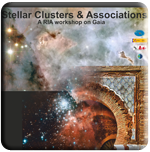The VLT-FLAMES Tarantula Survey. XVIII. Classifications and radial velocities of the B-type stars
Evans, C. J.; Kennedy, M. B.; Dufton, P. L.; Howarth, I. D.; Walborn, N. R.; Markova, N.; Clark, J. S.; de Mink, S. E.; de Koter, A.; Dunstall, P. R.; Hénault-Brunet, V.; Maíz Apellániz, J.; McEvoy, C. M.; Sana, H.; Simón-Díaz, S.; Taylor, W. D.; Vink, J. S.
Astronomy & Astrophysics, Volume 574, id.A13, 40 pp. (2015).
02/2015
ABSTRACT
We present spectral classifications for 438 B-type stars observed as part of the VLT-FLAMES Tarantula Survey (VFTS) in the 30 Doradus region of the Large Magellanic Cloud. Radial velocities are provided for 307 apparently single stars, and for 99 targets with radial-velocity variations which are consistent with them being spectroscopic binaries. We investigate the spatial distribution of the radial velocities across the 30 Dor region, and use the results to identify candidate runaway stars. Excluding potential runaways and members of two older clusters in the survey region (SL 639 and Hodge 301), we determine a systemic velocity for 30 Dor of 271.6 ± 12.2 kms-1 from 273 presumed single stars. Employing a 3σ criterion we identify nine candidate runaway stars (2.9% of the single stars with radial-velocity estimates). The projected rotational velocities of the candidate runaways appear to be significantly different to those of the full B-type sample, with a strong preference for either large (≥345 kms-1) or small (≤65 kms-1) rotational velocities. Of the candidate runaways, VFTS 358 (classified B0.5: V) has the largest differential radial velocity (-106.9 ± 16.2 kms-1), and a preliminary atmospheric analysis finds a significantly enriched nitrogen abundance of 12 + log (N/H) ≳ 8.5. Combined with a large rotational velocity (vesini = 345 ± 22 kms-1), this is suggestive of past binary interaction for this star.
Table 7 and Appendix A are available in electronic form at http://www.aanda.org


